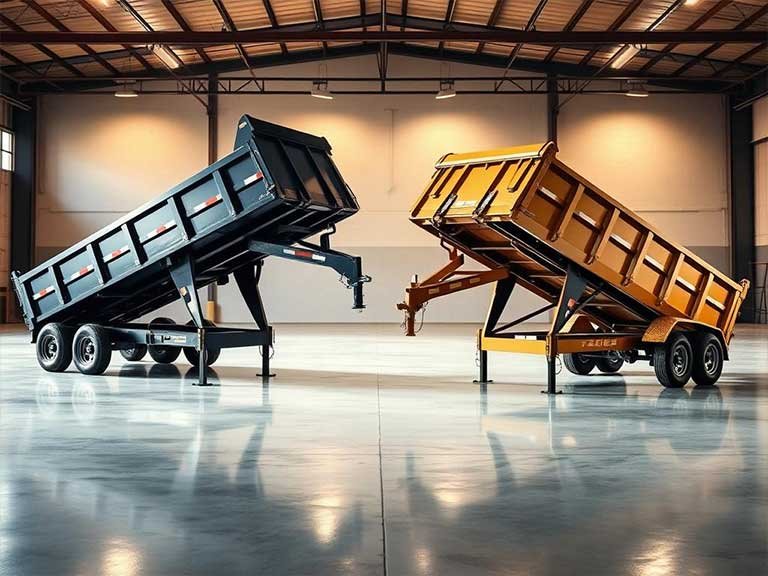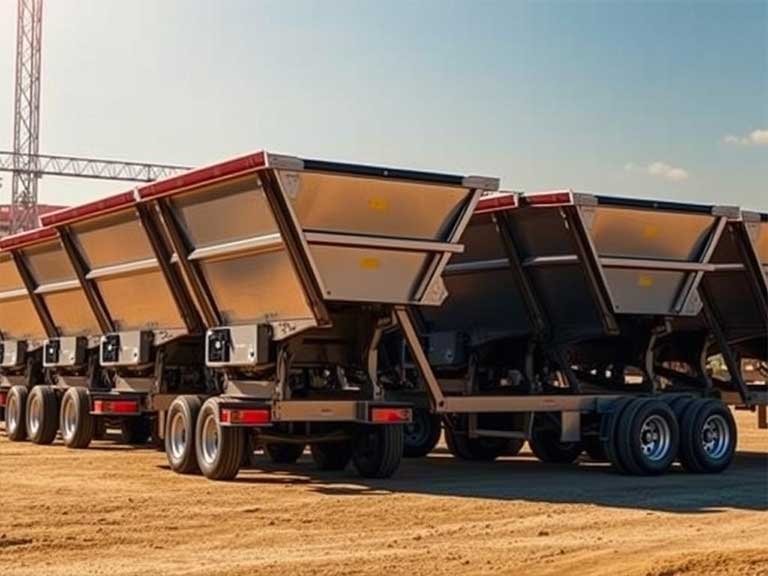Are you having trouble choosing the perfect end dump trailer? End dump trailers are key in the material transport world. They help in construction, mining, agriculture, and waste management. At Genron International Trade, we know how crucial the right equipment is for your business.
We can offer you different types of end dump trailers. The right end dump trailer can greatly improve your operations. Load capacity, material type, and worksite conditions are important in choosing the right one.
Table of Contents
Understanding End Dump Trailers
At Genron International Trade, we create end dump trailers for different needs. These trailers load materials by pushing the front up and letting them fall out the back.
What Are End Dump Trailers?
End dump trailers are special vehicles for moving materials. They use hydraulics to lift the front, letting materials fall out the back. They’re used in construction, mining, and more for moving things like aggregate and waste.
Key Features and Capabilities
End dump trailers are built strong with floors made from AR450 wear plate. They have a hydraulic hoist system, a strong body, and special tailgates. They also have features like single-point suspensions and advanced lights.
| Feature | Description | Benefit |
| Hydraulic Hoist System | Multi-stage hydraulic system for lifting the trailer bed | Efficient unloading of materials |
| Reinforced Floors | Made from AR450 wear plate material | Withstands heavy and abrasive materials |
| Tailgate Designs | Configurable as hi-lift, free flow, or combination styles | Versatility in handling different materials |
Begin with a bespoke semi-trailer designed for your exact needs. Whether it’s heavy-duty hauling or specialized cargo, we’ve got the perfect solution to keep you moving forward.
Types of Dump Trailers Compared
End dump trailers come in many types, each with its own benefits. We’ll look at the differences between end dump, side dump, bottom dump, and live bottom trailers.
End Dump vs. Side Dump Trailers
End dump trailers lift from the front to dump material out the back. Side dumps tilt sideways to dump. End dumps carry more and work in tight spaces, while side dumps are more stable.
End Dump vs. Bottom Dump Trailers
Bottom dump trailers have clamshell gates for controlled material piles. End dumps are better for creating piles and handling various cargo.
End Dump vs. Live Bottom Trailers
Live bottom trailers use a conveyor belt for dumping without lifting the trailer. They’re stable and precise but cost more and take longer to unload than end dumps.
Benefits of End Dump Trailers
End dump trailers offer many advantages, improving efficiency in various industries. We’ll dive into these benefits below.
Higher Load Capacity
End dump trailers have higher side walls. This lets them carry bigger and heavier loads. They need fewer trips, making work more efficient. They’re perfect for construction and mining.
Versatility in Material Transport
These trailers can haul many materials. From fine sand to big boulders, they’re very versatile. They’re great for construction sites and quarries.

Rapid Unloading Capabilities
End dump trailers have hydraulic lifts for quick unloading. This is key in busy work where time is everything. It lets operators unload fast and efficiently.
| Benefit | Description | Application |
| Higher Load Capacity | Carry larger and heavier loads | Construction, Mining |
| Versatility in Material Transport | Transport diverse materials | Construction, Quarrying |
| Rapid Unloading Capabilities | Quick discharge of materials | High-volume Operations |
Limitations to Consider
End dump trailers have many benefits but also some limits. Knowing these limits is key for safe and efficient use.
Stability Concerns During Unloading
These trailers can be unstable when unloading. Their raised bed makes them tip-prone, especially on uneven ground or in windy conditions.
Maneuverability Challenges
End dump trailers are long and hard to move in tight spaces. They need skilled drivers to handle them well.
Ground Condition Requirements
They work best on flat, stable ground. Unloading on sloped or unstable areas is risky.
| Limitation | Description | Impact |
| Stability Concerns | High center of gravity during unloading | Increased risk of tipping |
| Maneuverability Challenges | Difficulty navigating confined spaces | Requires skilled operators |
| Ground Condition Requirements | Need for level, stable ground | Increased tipping hazards on sloped or unstable surfaces |

How to Choose the Right End Dump Trailer
Choosing the right end dump trailer is important. At Genron International Trade, we help you find the perfect one for your needs.
Assessing Your Material Transport Needs
First, think about what you’ll be hauling. Consider the material’s density, how abrasive it is, and if it needs special containers.
Evaluating Worksite Conditions
Look at your work site carefully. Think about space, ground stability, and how high you can go. These things affect which trailer is best.
Considering Dump Trailer Dimensions and Capacity
First, figure out how much you need to carry. Think about the weight limits on roads and the space you have to load and unload. This will help you choose the right trailer size and strength.
Industry-Specific Applications
End dump trailers are used in many fields, like construction, mining, and farming. They are great because they can handle a lot and work well in different places.
Construction and Road Building
In construction, end dump trailers are perfect for moving materials like sand and asphalt. They help pile materials in the right spot, which is important for building roads and buildings.
Mining and Quarrying Operations
Mining uses end dump trailers because they can carry heavy, rough materials like rocks. They are built strong and can carry a lot, making mining work more efficient.
Agricultural Uses
Farmers use end dump trailers to move things like grain and fertilizer. They are flexible and help with many farm tasks all year round.

Key Specifications to Evaluate
When picking an end dump trailer, look at a few important things. These details affect how well the trailer works and lasts. Choosing the right trailer is about finding the best fit for your needs.
Body Construction and Materials
The trailer’s body and materials are key for lasting performance. Top models have strong wear plates to resist wear. The body shape also matters for how materials flow when unloading.
Suspension Systems
There are different suspension types for end dump trailers. Some are better for stability and safety, like the single-point system. Our trailers have a 50,000lb air ride suspension for smooth movement.
Tailgate Design Options
The tailgate design is also important. There are different types for different materials. Our trailers have a special tailgate design for better material handling.
Conclusion
Choosing an end dump trailer needs careful thought about your needs. We’ve talked about their strengths and weaknesses compared to other types.
End dump trailers are great for moving many types of materials. At Genron International Trade, we make high-quality trailers that can be customized for different businesses in Africa and Southeast Asia.
Talking to our experts can help you pick the best trailer. With the right choice, your business can grow and succeed for years.

FAQ
What are the key differences between end dump trailers and side dump trailers?
End dump trailers dump from the back, while side dump trailers dump from the side. This affects where they work best.
What are the stability concerns during unloading with end dump trailers?
End dump trailers might tip over when unloading, especially on uneven ground. Keeping the trailer in good shape and using outriggers can help prevent this.
Can end dump trailers be used in various industries, such as construction, mining, and agriculture?
Yes, end dump trailers are very versatile. They can be used in many industries like construction, mining, and agriculture. This is because they can carry a wide range of materials efficiently.
What factors should I consider when evaluating the suspension system of an end dump trailer?
When looking at the suspension system, think about a few things. Consider the trailer’s load capacity, the terrain it will be on, and how comfortable you want the ride to be. A good suspension system helps transport materials safely and efficiently.
How do ground conditions affect the operation of end dump trailers?
Ground conditions play a big role in how end dump trailers work. Uneven, soft, or sloping ground can make it hard to unload safely. It’s important to check the site before choosing a trailer.
What are the benefits of rapid unloading capabilities in end dump trailers?
Rapid unloading in end dump trailers makes things more efficient. It cuts down on unloading time. This means you can transport materials faster and work more productively.


